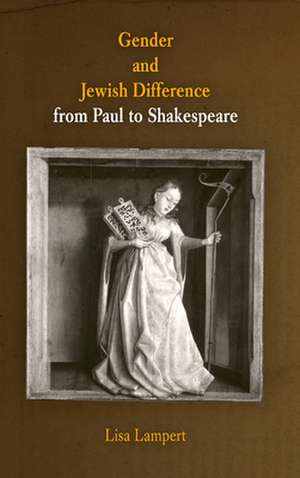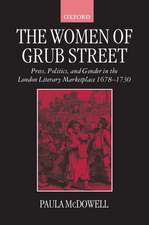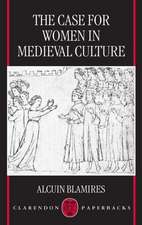Gender and Jewish Difference from Paul to Shakespeare: The Middle Ages Series
Autor Lisa Lamperten Limba Engleză Hardback – 4 mar 2004
Din seria The Middle Ages Series
-
 Preț: 195.13 lei
Preț: 195.13 lei -
 Preț: 192.05 lei
Preț: 192.05 lei -
 Preț: 281.27 lei
Preț: 281.27 lei -
 Preț: 199.23 lei
Preț: 199.23 lei -
 Preț: 198.22 lei
Preț: 198.22 lei -
 Preț: 240.85 lei
Preț: 240.85 lei -
 Preț: 192.05 lei
Preț: 192.05 lei - 19%
 Preț: 509.33 lei
Preț: 509.33 lei -
 Preț: 245.45 lei
Preț: 245.45 lei -
 Preț: 232.87 lei
Preț: 232.87 lei -
 Preț: 286.76 lei
Preț: 286.76 lei -
 Preț: 192.05 lei
Preț: 192.05 lei -
 Preț: 247.43 lei
Preț: 247.43 lei -
 Preț: 231.78 lei
Preț: 231.78 lei -
 Preț: 193.04 lei
Preț: 193.04 lei -
 Preț: 191.00 lei
Preț: 191.00 lei -
 Preț: 216.43 lei
Preț: 216.43 lei -
 Preț: 267.27 lei
Preț: 267.27 lei -
 Preț: 285.64 lei
Preț: 285.64 lei -
 Preț: 285.64 lei
Preț: 285.64 lei -
 Preț: 248.56 lei
Preț: 248.56 lei -
 Preț: 323.44 lei
Preț: 323.44 lei -
 Preț: 197.18 lei
Preț: 197.18 lei -
 Preț: 230.41 lei
Preț: 230.41 lei -
 Preț: 243.06 lei
Preț: 243.06 lei -
 Preț: 154.43 lei
Preț: 154.43 lei -
 Preț: 191.00 lei
Preț: 191.00 lei -
 Preț: 317.31 lei
Preț: 317.31 lei -
 Preț: 406.68 lei
Preț: 406.68 lei - 11%
 Preț: 439.33 lei
Preț: 439.33 lei -
 Preț: 183.69 lei
Preț: 183.69 lei -
 Preț: 285.88 lei
Preț: 285.88 lei - 19%
 Preț: 363.86 lei
Preț: 363.86 lei -
 Preț: 242.82 lei
Preț: 242.82 lei -
 Preț: 290.05 lei
Preț: 290.05 lei - 19%
 Preț: 420.74 lei
Preț: 420.74 lei - 23%
 Preț: 538.83 lei
Preț: 538.83 lei -
 Preț: 458.15 lei
Preț: 458.15 lei - 30%
 Preț: 406.56 lei
Preț: 406.56 lei -
 Preț: 232.58 lei
Preț: 232.58 lei - 19%
 Preț: 365.58 lei
Preț: 365.58 lei -
 Preț: 198.22 lei
Preț: 198.22 lei -
 Preț: 322.52 lei
Preț: 322.52 lei -
 Preț: 174.65 lei
Preț: 174.65 lei -
 Preț: 405.32 lei
Preț: 405.32 lei -
 Preț: 243.06 lei
Preț: 243.06 lei -
 Preț: 428.40 lei
Preț: 428.40 lei - 19%
 Preț: 415.74 lei
Preț: 415.74 lei -
 Preț: 239.77 lei
Preț: 239.77 lei
Preț: 472.04 lei
Preț vechi: 530.38 lei
-11% Nou
Puncte Express: 708
Preț estimativ în valută:
90.32€ • 98.42$ • 76.11£
90.32€ • 98.42$ • 76.11£
Carte tipărită la comandă
Livrare economică 23 aprilie-07 mai
Preluare comenzi: 021 569.72.76
Specificații
ISBN-13: 9780812237757
ISBN-10: 0812237757
Pagini: 288
Dimensiuni: 161 x 238 x 26 mm
Greutate: 0.56 kg
Ediția:New.
Editura: MT – University of Pennsylvania Press
Seria The Middle Ages Series
Locul publicării:United States
ISBN-10: 0812237757
Pagini: 288
Dimensiuni: 161 x 238 x 26 mm
Greutate: 0.56 kg
Ediția:New.
Editura: MT – University of Pennsylvania Press
Seria The Middle Ages Series
Locul publicării:United States
Notă biografică
Cuprins
Chapter 1. Introduction: Made, Not Born
Chapter 2. The Hermeneutics of Difference
Chapter 3. Reprioritizing the Prioress's Tale
Chapter 4. Creating the Christian in Late Medieval East Anglian Drama
Chapter 5. "O what a goodly outside falsehood hath!" Exegesis and Identity in The Merchant of Venice
Conclusion
Abbreviations
Notes
Bibliography
Index
Acknowledgments

















